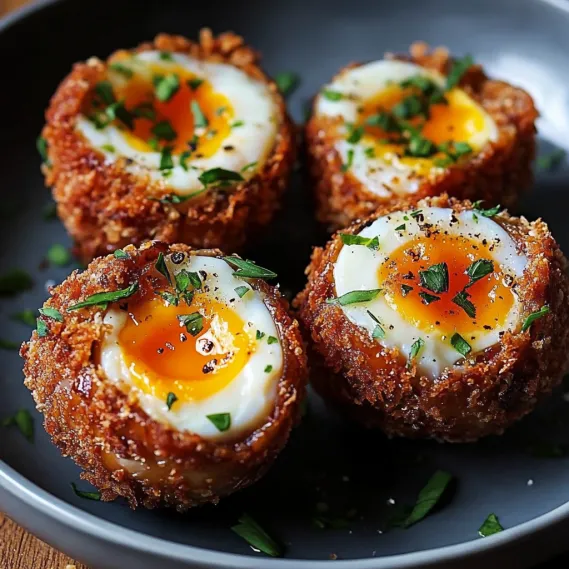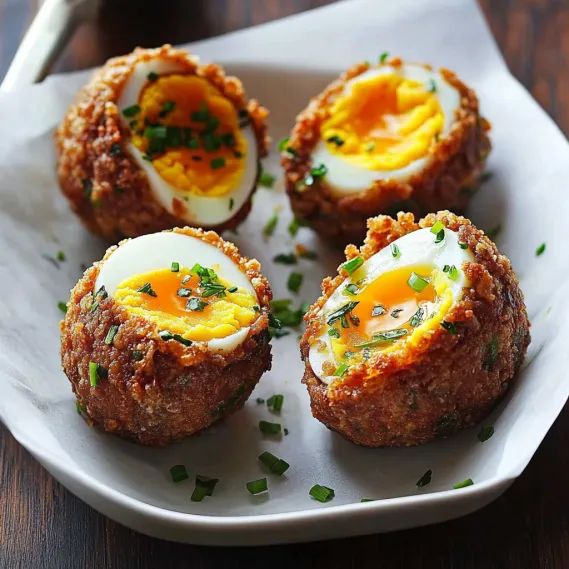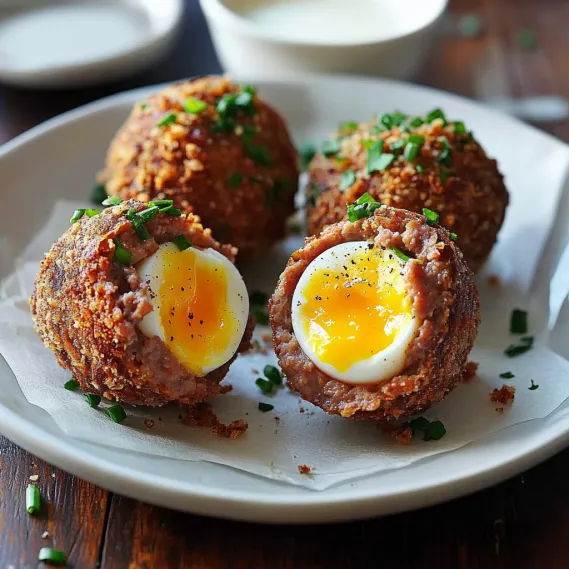 Pin it
Pin it
Scotch Eggs combine freshly made Scotch Eggs and experience perfect textural harmony – crispy golden panko giving way to savory herb-flecked sausage, revealing a perfectly cooked egg with jammy yolk. These protein-packed delicacies gained popularity in London's 18th-century taverns as ideal drinking snacks.
I first made this recipe when looking for an impressive yet manageable dish for weekend entertaining. After experimenting with various cuts of shrimp and butter combinations, this version became an instant favorite. My husband declared them the best scampi he's ever tasted, and now guests always request them at our gatherings.
Essential Ingredients and Selection Tips
- Eggs: Choose large, fresh eggs; week-old eggs peel easier
- Breakfast Sausage: High-quality pork with visible herbs and good fat
- Panko Breadcrumbs: Creates lighter coating than traditional breadcrumbs
- Fresh Herbs: Chives and parsley brighten the sausage mixture
- English Mustard: Adds distinctive flavor and subtle heat
I've found that adding a small amount of chicken powder (bouillon) makes a significant difference in achieving that authentic takeaway flavor. If you don't have it, mushroom powder makes an excellent substitute that adds similar umami depth without changing the overall profile of the dish.
Detailed Cooking Instructions
- Step 1: Perfect the Soft-Boiled Eggs
- Boil eggs for 4 minutes for jammy yolks or 6-7 minutes for firmer centers. Transfer to ice bath for 10 minutes, then peel carefully.
- Step 2: Prepare the Flavorful Sausage Mixture
- Combine sausage with chopped herbs, mustard, salt, pepper, and nutmeg. Mix thoroughly without overworking the meat.
- Step 3: Master the Wrapping Technique
- Divide sausage into four portions. Flatten each into an oval, place egg in center, then wrap sausage around completely, smoothing the surface.
- Step 4: Apply the Double Coating
- Roll each wrapped egg in seasoned flour, then beaten egg, then panko breadcrumbs, pressing gently to adhere.
- Step 5: Fry with Precision
- Heat oil to 325°F and fry for 5-7 minutes until golden and cooked through (160°F internal temperature). Drain on paper towels before serving.
 Pin it
Pin it
My first attempt at these Scotch Eggs taught me the importance of precise timing and an ice-cold bath to stop cooking immediately for Instagram-worthy jammy centers. The yolk should set at the edges but remain soft in the center, creating that moment of revelation when cut open.
The Art of the Perfect Yolk
Precise timing and an ice-cold bath stop cooking immediately for Instagram-worthy jammy centers. The yolk should set at the edges but remain soft in the center, creating that moment of revelation when cut open.
 Pin it
Pin it
Make-Ahead and Serving Options
Boil and peel eggs up to two days ahead. Assemble and bread a day in advance, then fry before serving. Enjoy hot, room temperature, or cold with mustard, herbed mayo, or piccalilli.
Baked Alternative Method
For a lighter version, bake breaded eggs at 375°F for 25-30 minutes until golden and 160°F internally. Slightly less crispy than fried but healthier and practical for crowds.
Creative Variations
Experiment with Italian-style (basil, oregano, parmesan), Mexican-inspired (chorizo, paprika), or Asian fusion (ginger, garlic, green onion) while maintaining the classic textural contrast.
 Pin it
Pin it
Chef's Helpful Tips
- Use pre-peeled eggs for large gatherings
- Refrigerate cooked eggs before slicing for neater cuts
- Freeze soft-boiled eggs briefly before wrapping
- Add cold water to egg wash for more even coating
- Rest fried eggs on wire rack for maximum crispness
Frequently Asked Questions
- → Can I bake Scotch eggs instead of frying them?
- Yes, you can bake Scotch eggs for a lighter option. After coating them in breadcrumbs, place them on a parchment-lined baking sheet and lightly spray or brush with oil. Bake at 400°F (200°C) for about 25-30 minutes, rotating halfway through, until the sausage reaches an internal temperature of 160°F (71°C) and the outside is golden brown. The texture won't be exactly the same as fried - the coating will be less evenly crisp - but they'll still be delicious.
- → What's the best way to prevent the sausage from splitting during cooking?
- To prevent splitting, ensure your sausage layer is even all around the egg (about 1/4 inch thick) with no thin spots. Make sure the sausage is completely sealed with no air pockets between it and the egg. Chilling the assembled Scotch eggs in the refrigerator for 20-30 minutes before coating and frying helps the sausage firm up and hold together better. Finally, maintain a steady oil temperature around 325°F - if the oil is too hot, the outside will cook too quickly and cause the sausage to split before it's cooked through.
- → Can I use different types of sausage or make vegetarian Scotch eggs?
- You can definitely experiment with different sausage varieties - Italian, chorizo, or even black pudding work well for interesting flavor variations. For vegetarian Scotch eggs, substitute the sausage with a mixture of cooked, mashed chickpeas, breadcrumbs, grated cheese, finely chopped mushrooms, and bound with an egg. Vegetarian sausage meat alternatives also work well. Season generously with herbs and spices to replicate the savory sausage flavor, and consider adding a bit of nutritional yeast for umami depth.
- → How do I get the perfect soft-boiled egg center?
- For a perfect jammy egg center, timing is crucial. Start with refrigerated eggs and carefully lower them into already boiling water. Boil medium to large eggs for exactly 6 minutes, then immediately transfer to an ice bath to stop cooking. Peel very gently under running water once completely cooled. When frying the assembled Scotch eggs, ensure your oil temperature stays at 325°F and don't fry for longer than necessary to cook the sausage (about 4-5 minutes). If your eggs are small, reduce the boiling time to 5 minutes; if they're extra large, add 30 seconds.
- → How far in advance can I make Scotch eggs?
- Scotch eggs can be made up to 3 days in advance and stored in an airtight container in the refrigerator. They're actually excellent cold, making them perfect for meal prep. If you prefer them warm, reheat in a 350°F (175°C) oven for about 10 minutes (avoid microwaving as it can make the coating soggy). You can also prepare them up to the coating stage and refrigerate for up to 24 hours before frying. For longer storage, fully cooked Scotch eggs can be frozen for up to 3 months - just thaw overnight in the refrigerator before reheating.
